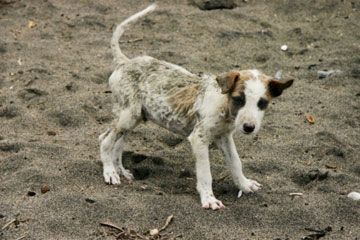Coccidia and Giardia: Protozoal Parasites
There are two different types of worm-like organisms that can infect your dog and cause some serious problems: coccidia and giardia. Coccidia is a single-celled microscopic organism that causes an infection called coccidiosis; luckily it isn't a common one. However, if you have a young puppy he may be infected because it can flourish in crowded, unsanitary conditions. Coccidia can also infect older dogs that have compromised immune systems due to another illness. The eggs are shed in the feces of infected animals and contaminate water, food or the environment. After they're consumed, the eggs hatch in dogs' intestinal tracts. They can also lie dormant in the tracts of dogs who are otherwise unaffected (but continue to shed the eggs in their feces) and become activated when a dog experiences severe stress.
Once they swing into action, however, these little protozoans start doing their dirty work, causing diarrhea, weakness, lack of appetite, anemia, and dehydration. The diarrhea can bloody and severe, and dehydration can lead to death. Most cases of coccidiosis are mild, however, and clear up with a few weeks of sulfa drugs and antibiotics. Good hygiene is the key to containing and preventing coccidiosis. Pick up your dog's stool immediately and keep him from eating stool. Also try to keep down the rodent and insect population around your house, because both cockroaches and mice can be carriers. If your dog is diagnosed with coccidiosis, thoroughly clean his living area using a 10% ammonia solution, steam or boiling water.
Advertisement
Giardia is another pesky protozoal parasite -- and unlike coccidia, it can affect people as well as pets. However, giardia is somewhat mysterious. We aren't quite sure how many types there are, and whether the type that infects dogs can infect humans and vice versa. Some vets disagree on how best to treat an infection (known as giardiosis). Giardia is often waterborne, entering the water supply through contamination by wild animals, dogs, and people. Instead of eggs, they are in the form of cysts that activate in the small intestine. Then the parasite divides itself, forms more cysts and is shed in feces. Both dogs and people can have giardiosis but not have any symptoms. The most common sign is diarrhea, which may appear bloody or slimy. It can be hard to detect, so some vets will treat for giardiosis if there is no other obvious cause for diarrhea. The most common treatment is an antiprotozoal drug. Protect your dog by not letting him drink from streams, rivers, or lakes, no matter how clean they may look.
Heartworm is a misnomer -- they can actually affect the lungs and other organs too. Read on to find out why this worm can be deadly.


